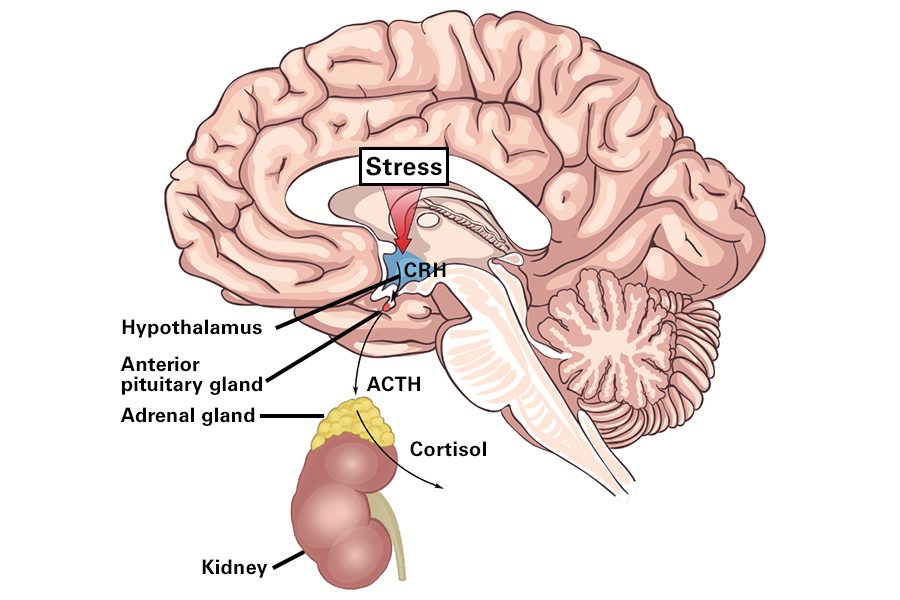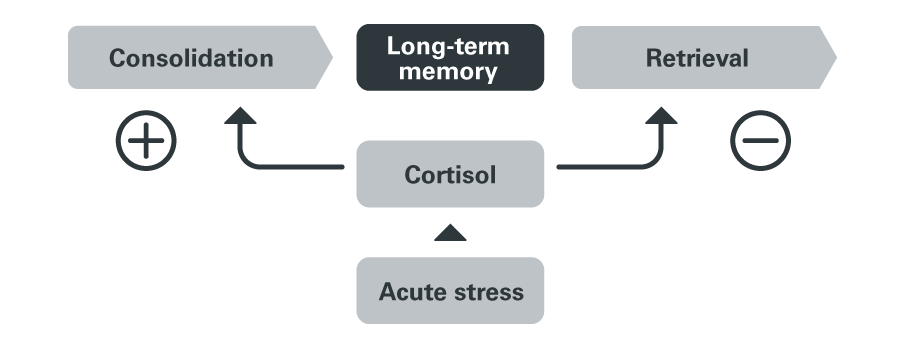MEMORY DEFICITS
4.2
Stress and memory
Does cortisol always impair memory? Read this article by Dominique de Quervain.
Stress activates the hypothalamus-pituitary-adrenal axis, resulting in the release of glucocorticoid hormones (cortisol in humans) from the adrenal cortex. See Figure 1.

Figure 1: Stress leads to the release of corticotropin-releasing hormone (CRH) from the hypothalamus, stimulating the release of adrenocorticotropic hormone (ACTH) from the pituitary gland into the blood stream. In the cortex of the adrenal gland, ACTH stimulates the production and release of cortisol. Cortisol has many physiological functions and acts back upon the hypothalamus and pituitary to suppress CRH and ACTH production (negative feedback).
In an acute stress situation, cortisol is released and soon enters the brain, where it binds to glucocorticoid receptors in the hippocampus and temporarily and reversibly reduces the ability to retrieve previously learned information (de Quervain, 1998). Interestingly, cortisol enhances memory consolidation (see Figure 2, Stress and memory). These opposite effects of cortisol on memory happen at the same time. Take an exam, for example, during which a student severely struggles to recall learned information due to the stressful situation (impairing effect of cortisol on memory retrieval). At the same time, information about the exam situation is being stored extremely well into the student’s memory allowing them to recall vivid memories of this awful experience even years later (enhancing effect of cortisol on memory consolidation).

Figure 2: Cortisol is released into the blood stream in response to stress, and when it reaches the brain, it enhances memory consolidation for new information but impairs the retrieval of previously stored information.
Conditions where glucocorticoid levels are chronically high are usually associated with impaired cognitive performance, and these deficits have been thought to result from a cumulative and long-lasting burden on hippocampal function and morphology. It became clear, however, that the memory deficits observed in such chronic conditions could also be, at least in part, a result of acute, reversible glucocorticoid effects on memory retrieval processes (Coluccia et al., 2008).
To conclude, both acutely and chronically elevated cortisol levels can cause reversible retrograde amnesia. Read more about amnesia in the next article.
References
de Quervain et al., Nature. 1998 Aug 20;394(6695):787-90. doi: 10.1038/29542. PMID: 9723618.
Coluccia et al., J Neurosci. 2008 Mar 26;28(13):3474-8. doi: 10.1523/JNEUROSCI.4893-07.2008.
Lizenz
University of Basel
